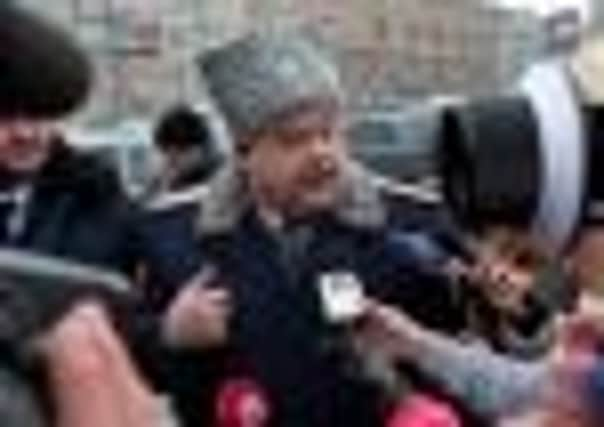Cossack street patrol evokes the spectre of imperial Russia


With the approval of city authorities, eight Cossacks clad in fur hats and uniforms patrolled a Moscow train station yesterday looking for signs of minor public disturbances.
The Kremlin is seeking to use the once-feared Tsarist paramilitary squads in its new drive to promote conservative values and appeal to nationalists.
Advertisement
Hide AdAdvertisement
Hide AdThe southern province of Krasnodar – which includes Sochi, the site of the 2014 Winter Olympics – launched Cossack patrols in September to crack down on Muslim migrants from the neighbouring Caucasus.
Cossacks trace their history in Russia back to the 15th century. Serving in the Tsarist cavalry, they spearheaded imperial Russia’s expansion in exchange for special privileges, including the right to govern their villages.
In the 2010 census, about 650,000 Russians declared themselves Cossacks. Yesterday’s patrol was a test run for whether the group can become an armed and salaried auxiliary police force, with the power of arrest, patrol leader Igor Gulichev said.
Mr Gulichev’s group, which he said numbers up to 85, has patrolled south-western Moscow with police approval for the past year, and has brought about 35 arrests. They are unpaid but receive free public transport passes and uniforms.
The conservative Cossacks have increased their political activity in response to an impromptu protest that feminist punk rockers Pussy Riot staged in Moscow’s main cathedral in February.
Groups of Cossacks recently barred visitors from entering a Moscow art exhibition that daubed Pussy Riot’s trademark balaclavas over Orthodox Christian icons, and they led a successful campaign to cancel a staging of Vladimir Nabokov’s racy novel, Lolita, in St Petersburg.
A government-backed Cossack political party held its first congress in Moscow last weekend. Communists have called it a cheap attempt to siphon pensioners’ support from their party, which is widely known by the same acronym. Six other groups have applied to form splinter Cossack parties.
Mr Gulichev, whose official title is deputy ataman, a Turkic word meaning commander, said he expected his group’s responsibilities would expand to fighting drug trafficking and terrorism, mirroring the special relationship Cossacks had with the tsars.
Advertisement
Hide AdAdvertisement
Hide Ad“Cossacks have always been on the frontiers of the Russian empire, fighting foes and adversaries, illegal immigration – repulsing raids, as people say today,” he added.
President Vladimir Putin was inducted into what is known as the Cossack host in 2005 and given the rank of colonel, previously held by tsars.
A 400,000-strong all-Russia Cossack host directly subordinate to Mr Putin is scheduled to be launched by the end of the year.